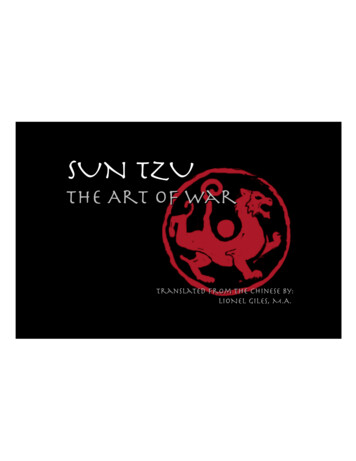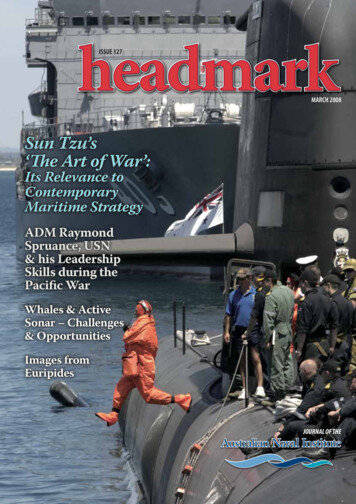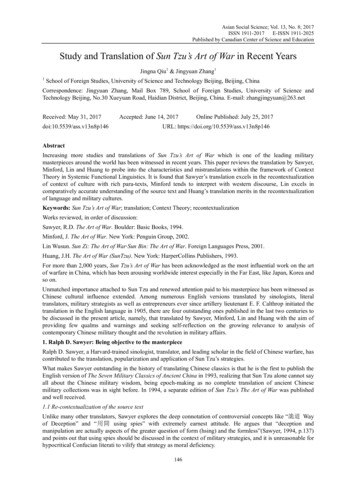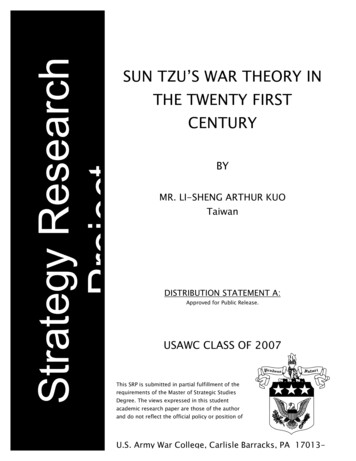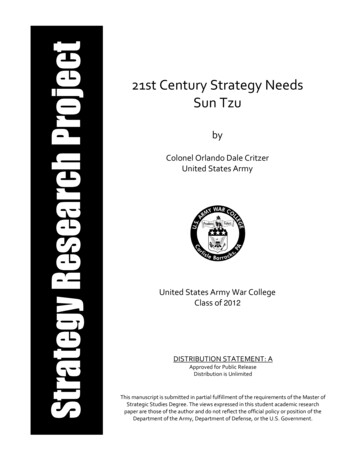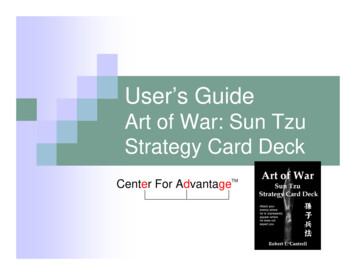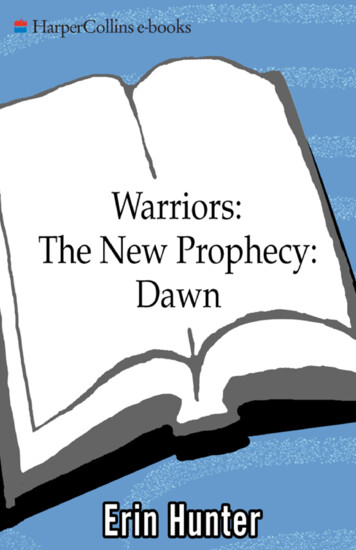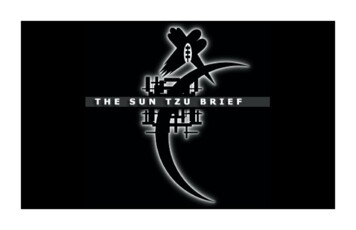
Transcription
S U RV E YTHE SUN TZU BRIEFAMES ::CLAVELL ::WING ::HANZHANG ::SAWYER ::KRAUSE ::HUANG ::GRIFFITH ::CLEARY ::www.vsente.com
S U RV E YTHE SUN TZU BRIEFAMES ::CLAVELL ::WING ::HANZHANG ::SAWYER ::KRAUSE ::HUANG ::GRIFFITH ::CLEARY EUVERVARIABLESMARCHESTERRAINNINEFIREESPIONAGE
INTRODUCTIONTHE SUN TZU BRIEFMany of our most “forward” thinkers in business and academia reject military thought in contemporary business - which is to beexpected. At face value, military thought invokes bloodshed and violence. But is unfortunate because there is much contemporarybusiness might learn from traditional military disciplines. And ironic, because in the case of Sun Tzu winning is not defined by bloodshedor annihilation, but by winning without fighting. Which is a lesson every business can profit from. Sun Tzu is the father of modernday maneuver theory.The Sun Tzu Brief is a synopsis of nine different translations of Sun Tzu’s Art of War. The synopsis is organized according to thethirteen chapters of the Art of War and provides a summary of the content found in each chapter. Additionally, the title of each chapteras translated by the various “editors” is provided.The brief is designed as an introduction to Sun Tzu’s Art of War as is not meant to be a replacement for the actual text. The firstversion of this brief was written in 1989 and continues to evolve as of this writing. A bibliography of the nine translations can befound at the end of the briefing.Mike Smock 2003www.vsente.com
01S U RV E YTHE SUN TZU BRIEFAMES :: On AssessmentsCLAVELL :: Laying PlansWING :: The CalculationsHANZHANG :: EstimatesSAWYER :: Initial EstimatesKRAUSE :: PlanningHUANG :: SurveyingGRIFFITH :: EstimatesCLEARY :: Strategic Estimateswww.vsente.comWar is a vital matter of state and as such the commanders ability to survey, assess,calculate, plan and lead is of the highest importance. There is no substitute for leadership. The commander is supreme.“Therefore use these assessments for comparison, to find out what the conditions are.That is to say, which political leadership has the Way? Which general has ability? Whohas the better climate and terrain? Whose discipline is effective? Whose troops are thestronger? Whose officers and soldiers are the better trained? Whose system of rewardsand punishments is clearer? This is how you can know who will win.” CLEARY“Warfare is the art (Tao) of deceit. Therefore, when able seem to be unable; when ready,seem unready; when nearby, seem far away; and when far away, seem near. If theenemy seeks some advantage, entice him with it. If he is in disorder, attach him andtake him. If he is formidable, prepare against him. If he is strong, evade him. If he isincensed, provoke him. If he is humble encourage his arrogance. If he is rested, wearhim down. If he is internally harmonious, sow divisiveness in his ranks. Attack wherehe is not prepared: go by way of places where it would never occur to him you wouldgo. These are the military strategist’s calculations for victory they cannot be settled inadvance.” AMES“If you say which ruler possesses moral influence, which commander is the more able,which army obtains the advantages of nature and the terrain, in which regulation aninstructions are better carried out, which troops are the stronger; attach they are happyand when they hear the gongs sound the retirement they are enraged. He who is likethis is strong.” GRIFFITH
02WAG I N GTHE SUN TZU BRIEFAMES :: On Waging BattleCLAVELL :: On Waging WarWING :: The ChallengeHANZHANG :: Waging WarSAWYER :: Waging WarKRAUSE :: Competitive ActionsHUANG :: Mobilizing For Armed ConflictGRIFFITH :: Waging WarCLEARY :: Doing Battlewww.vsente.comWaging war is expensive. Always leverage and exploit. Prolonged conflict even whenyou are winning is failing. A good plan violently executed now is better than a perfectplan executed next week. A rapid fire series of small containable conflicts is preferableover a single large conflict.“A thousand pieces of gold will be spent each day. Crude yet quick Strategies havebeen known. Therefore, clever leaders endeavor to use their opponent’s food. Onecontainer of the opponent’s food is the same as twenty containers of their own; andone unit of fodder is the same as twenty units of their own. The best triumph is aswift one. “WING“When you do battle, even if you are winning, if you continue for a long time it willdull your forces and blunt your edge; if you besiege a citadel, your strength will beexhausted. If you keep your armies out in the field for a long time, your supplies willbe insufficient.” CLEARY“Those who are near the army sell at high prices. Because of high prices, thewealth of the common people is exhausted.When resources are exhausted, thenlevies are made under pressure. When power and resources are exhausted, then thehomeland is drained. The common people are deprived of seventy percent of theirbudget, while the government s expenses for equipment amount to sixty percent ofits budget.Therefore a wise general strives to feed off the enemy. Each pound offood taken from the enemy is equivalent to twenty pounds you provide by yourself.”CLEARY
03OFFENSIVETHE SUN TZU BRIEFAMES :: Planning the AttackCLAVELL :: The Sheathed SwordWING :: The Plan of AttackHANZHANG :: Offensive StrategySAWYER :: Planning OffensivesKRAUSE :: Competitive StrategyHUANG :: Planning an OffenseGRIFFITH :: Offensive StrategyCLEARY :: Planning a Siegewww.vsente.comWhen planning an offensive, direct conflict with the enemy is avoided. Instead offensivestrategy driven by foreknowledge and focused on exploiting strategy is preferred. “So towin a hundred victories in a hundred battles is not the highest excellence; the highestexcellence is to subdue the enemy’s army without fighting at all.” AMESBest Military policy is to attack strategies; the next to attack alliances; the next to attacksoldiers; and the worst to assault walled cities.” AMES“So it is said that if you know others and now yourself, you will not be imperiled in ahundred battled; if you do not know others but know yourself, you win one and loseone; if you do not know others and do not know yourself, you will be imperiled in everysingle battle.” CLEARY“To subdue the enemy without fighting is the supreme excellence. Thus, what is ofsupreme importance in war is to attack the enemy’s strategy. Next best is to disrupt hisalliances by diplomacy. The next best is to attack his army. And the worst policy is toattack cities. Know the enemy and know yourself; in a hundred battles, you will neverbe defeated. When you are ignorant of the enemy but know yourself, your chance ofwinning or losing are equal. If ignorant both of your enemy and of yourself, you are sureto be defeated in every battle.” HANZHANG“So the rule for use of the military is that if you outnumber the opponent ten to one, thensurround them; five to one, attack; two to one, divide. If you are equal, then fight if youare able. If you are fewer, then keep away if you are able. If you are not as good, thenflee if you are able. Therefore, if the smaller side is stubborn, it becomes the captiveof the larger side.” CLEARY
04F O R M AT I O NTHE SUN TZU BRIEFAMES :: Strategic PositionsCLAVELL :: TacticsWING :: PositioningHANZHANG :: DispositionsSAWYER :: Military DispositionKRAUSE :: PositioningHUANG :: ControlGRIFFITH :: DispositionsCLEARY :: Formationwww.vsente.comPrepare. Enter only those battles having first won the victory. Never allow yourself tobe drawn into a battle that you are unprepared for. Adopt only those formations whichallow you to become invincible.Those skilled in defense hide in the deepest depths of the earth, those skilled in attackmaneuver in the highest heights of the sky. Therefore they can preserve themselvesand achieve complete victory. “ CLEARY“.The rules of the military are five: measurement, assessment, calculation, comparison, and victory. The ground gives rise to measurements, measurements giverise to assessments, assessments give rise to calculations, calculations give rise tocomparisons, comparisons give rise to victories.” CLEARY“Anciently the skillful warriors first made themselves invincible and awaited the enemy’smoment of vulnerability.” GRIFFITH“For this reason, the victorious army only enters battle after having first won the victory,while the defeated army only seeks victory after having first entered the fray.” AMES
05FORCETHE SUN TZU BRIEFAMES :: Strategic AdvantageCLAVELL :: EnergyWING :: DirectingHANZHANG :: Posture of ArmySAWYER :: Strategic Military PowerKRAUSE :: Opportunity and TimingHUANG :: Combat PowerGRIFFITH :: EnergyCLEARY :: Forcewww.vsente.comFormations which project force can have infinite variations. Compelling the opponentto move to their disadvantage and while generating momentum to your advantage isnecessary in order to achieve victory.There are no more than five cardinal notes, yet in combination, they produce moresounds than could possibly be heard; there are no more that five cardinal colors, yet incombination, they produce more shades and hues than could possibly be seen; thereare no more than five cardinal tastes, yet in combination, they produce more flavorsthan could possibly be tasted. For gaining strategic advantage (shih) in battle, thereare no more than “surprise” and “straightforward” operations, yet in combination, theyproduce inexhaustible possibilities. “Surprise” and “straightforward” operations give riseto each other endlessly just as a ring is without a beginning or an end. And who canexhaust their possibilities?” AMES“.The ideal strategy during conflict is to move opponents here and there, until they areperfectly positioned to their own disadvantage. This strategy, which he called Directing,is the art of compelling the opponent to react to whatever information is presented. Itis a skill that is used by leaders who are gifted with creative, insightful minds. tacticscould be used, in endless variations, to orchestrate surprise, skillful leaders create theappearance of confusion, fear or vulnerability, causing the opponent to perceive a falseweakness. The opponent is helplessly drawn toward this illusion of advantage. “Throughthe promise of gain, an opponent is moved about while the team lies in wait.” WINGGetting people to fight by letting the force of momentum work is like rolling logs androcks. Logs and rock are still when in a secure place, but roll on an incline; they remainstationary if square, they roll if round. Therefore, when people are skillfully led intobattle, the momentum is like that of round rocks rolling down a high mountain this isforce. CLEARY
06A D A P TAT I O NTHE SUN TZU BRIEFAMES :: Weak Points and Strong PointsCLAVELL :: Weak Points and StrongWING :: Illusion and RealityHANZHANG :: Void and ActualitySAWYER :: Vacuity and SubstanceKRAUSE :: ControlHUANG :: Superiority and InferiorityGRIFFITH :: Weaknesses and StrengthCLEARY :: Emptiness and Fullnesswww.vsente.comThe ability to change and adapt according to threats and opportunities is strategicgenius.“Brilliant leaders use creative Illusion in all of their strategies. Illusions that cause theopponent to lose perspective and make mistakes. Moreover, they build spontaneity intotheir strategy so that they continually force their opponents to readjust.” WING“When the control of forces approaches its zenith, evolve into imperceptible control.With imperceptible control, no deeply hidden agents can penetrate and no ingeniousmen can scheme. So, our victories in battles will not be repeated and our responsivecontrol will be unlimited. “HUANG“So a military force has no constant formation, water has no constant shape: the abilityto gain victory by changing and adapting according to the opponent is called genius.”CLEARY“Be extremely subtle, even to the point of formlessness. Be extremely mysterious, evento the point of soundlessness. Thereby you can be the director of the opponent’s fate.”CLEARY
07MANEUVERTHE SUN TZU BRIEFAMES :: Armed ContestThe ability to systematically convert strategic vision into global action faster than theopponent is necessary in order to successfully shape and maneuver.“Hence, during swiftness, be like the wind. During stillness, be like the forest. Duringaggression, be like fire. During immobility, be like a mountain. Be as unknowable as thedark. Move like a thunderbolt.” WINGHANZHANG :: Maneuvering“On the field of battle, the spoken word does not carry far enough; hence the institutionof gongs & Drums. Nor can ordinary objects be seen clearly enough; hence the institution of banners and flags. Gongs and drums, banners and flags are means wherebythe ears and eyes of the most may be focused on one particular point. The host thusforming a single united body, it is impossible either for the brave to advance alone or thecommander to retreat alone.” CLAVELLSAWYER :: Military Combat“The secret of deception is knowing how to manipulate the enemy’s perception”KRAUSECLAVELL :: ManeuveringWING :: Engaging the ForceKRAUSE :: Managing Direct ConflictHUANG :: Armed ContentionGRIFFITH :: ManoeuvreCLEARY :: Armed Strugglewww.vsente.com“So if you travel light, no stopping day or night, doubling your usual pace, strugglingfor an advantage a hundred miles away, your military leaders will be captured. Strongsoldiers will get there first, the weary later on, as a rule, one in ten make it. Strugglingfor an advantage fifty miles away will thwart the forward leadership, and as a rule onlyfifty percent of the soldiers make it. Struggle for an advantage thirty miles away, and twoout of three get there. So an army perishes if it has no equipment, it perishes if it has nofood, and it perishes if it has no money.” CLEARY
08VA R I A B L E STHE SUN TZU BRIEFAMES :: Adapting to the Nine ContingenciesCLAVELL :: Variation of TacticsWING :: The Nine VariationsHANZHANG :: The Nine VariablesSAWYER :: The Nine VariablesKRAUSE :: FlexibilityHUANG :: The Nine AdaptationsGRIFFITH :: The Nine VariablesCLEARY :: Adaptationswww.vsente.comKnow all variables and adaptations. Know terrain, ritual and culture. Know strengths andweaknesses. Knowledge prevents surprise and assures victory.“He should not make camp on difficult terrain; he should join with his allies onstrategically vital intersections; he should not linger on cutoff terrain; he should havecontingency plans on terrain vulnerable to ambush; and he should take the fight tothe enemy on terrain from which there is no way out. There are roadways not to betraveled, armies not to be attacked, walled cities not to be assaulted, territory not to becontested, and commands from the ruler not to be obeyed.” AMES“There are five qualities which are fatal in the character of a general: If reckless, he canbe killed; if cowardly, captured; if quick-tempered, he can be provoked to rage and makea fool of himself; if he has too delicate a sense of honor, he can be easily insulted; if heis of a compassionate nature, you can harass him.” HANZHANG“Therefore generals who know all possible adaptations to take advantage of the groundknow how to use military forces. If generals do not know how to adapt advantageously,even if they know the lay of the land they cannot take advantage of it. If they rule armieswithout knowing the arts of complete adaptivity, even if they know what there is to gain,they cannot get people to work for them.” CLEARY“So the rule of military operations is not to count on opponents not coming, but to relyon having ways of dealing with them; not to count on opponents not attacking, but torely on having what cannot be attacked. “ CLEARY
09MARCHESTHE SUN TZU BRIEFAMES :: Deploying the ArmyCLAVELL :: The Army on the MarchWING :: Moving the ForceHANZHANG :: On the MarchSAWYER :: Maneuvering the ArmyKRAUSE :: ManeuveringHUANG :: Troop ManeuversGRIFFITH :: MarchesCLEARY :: Maneuveringwww.vsente.comMarches require supreme vigilance and experienced judgement. Prime intelligence isnecessary to respond accurately to changing terrain and evolving situations.“If the enemy is close and yet quiet, He occupies a strategic position; If he is at a distanceand yet acts provocatively, He wants us to advance, Where He has positioned himself on levelground, He is harboring some advantage; If there is movement in the trees, He is coming. Ifthere are many blinds in the bushes, He is looking to confuse us; If birds take to flight, He is lyingin ambush; If animals stampede in fear, He is mounting a surprise attack; If the dust peaks uphigh, His chariots are coming; If the dust spreads out low to the ground, His infantry is coming;If the dust reaches our to scattered ribbons, His firewood details have been dispatched; If afew clouds of dust come and go, He is making camp. If his envoys are modest of word yethe continues to increase his readiness for war, He will advance; If His language is belligerentand he advances aggressively, He will withdraw; If His light chariots move out first And take upposition in the flanks He is moving into formation; If He has suffered no setback and yet suesfor peace, he is plotting; If He moves rapidly with his troops in formation, He is setting the timefor battle; If some of his troops advance and some retreat, He is seeking to lure us forward. Ifthe enemy soldiers lean on their weapons, They are hungry; If those sent for water first drinkthemselves, They are thirsty; If there is an advantage to be had yet they do not advance tosecure it, They are weary; Where birds gather, The enemy position is unoccupied; Where thereare shouts in the night, The enemy is frightened; Where there are disturbances in the ranks,The enemy commander is not respected; Where their flags and pennants are shifted about, Theenemy is in disorder; Where his officers are easily angered, The enemy is exhausted. Wherethe enemy feeds his horses grain and his men meat, And where His men no longer bother tohang up their water vessels, Or return to camp, The now-desperate enemy is ready to fight tothe death. Where, hemming and hawing, The enemy commander speaks to his subordinates ina meek and halting voice, He has lost his men. Meting out too many reward Means the enemyis in trouble, And meting out too many punishments Means he is in dire straits. The commanderwho erupts violently at his subordinates, Only then to fear them, Is totally inept. When theenemy’s emissary comes with conciliatory words He wants to end hostilities. “ SAWYER
10TERRAINTHE SUN TZU BRIEFAMES :: The TerrainCLAVELL :: TerrainWING :: Situational PositioningHANZHANG :: TerrainSAWYER :: Configurations of TerrainKRAUSE :: Competitive SituationsHUANG :: TerrainGRIFFITH :: TerrainCLEARY :: Terrainwww.vsente.comThe ability to prosecute campaigns on varying terrain is of utmost importance. Theability to maneuver adversaries to terrain least advantageous to their strengths and mostexploitative of their weaknesses allows the commander to win with little or no conflict.“If you know your soldiers are capable of striking, but do not know whether the enemyis invulnerable to a strike, you have half a chance of winning. If you know the enemyis vulnerable to a strike, but do not know if you soldiers are incapable of making sucha strike, you have half a chance of winning. If you know the enemy is vulnerable to astrike, and know your soldiers can make the strike, but do not know if the lay of the landmakes it unsuitable for battle, you have half a chance of winning.” CLEARY“The contour of the land is an aid to an army; sizing up opponents to determine victoryassessing dangers and distances, is the proper course of action for military leaders.Those who do battle knowing these will win, those who do battle without knowing thesewill lose.” CLEARY“Know the other, know yourself, And the victory will not be at risk; Know the ground,know the natural conditions, And the victory can be total. “ AMES“By perceiving the geographical factors and perceiving the cyclic natural occurrences,victory thereby is complete.” HUANG
11NINETHE SUN TZU BRIEFAMES :: The Nine Kinds of TerrainCLAVELL :: The Nine SituationsWING :: The Nine Varieties of GroundHANZHANG :: The Nine SituationsSAWYER :: Nine TerrainsKRAUSE :: Competitive ConditionsHUANG :: The Nine ZonesGRIFFITH :: Nine Varieties of GroundCLEARY :: Nine Groundswww.vsente.comWhen conflict is inevitable, and fighting unavoidable, then the terrain upon whichthe conflict is prosecuted and the motivation and bearing of the troops is of utmostimportance. Effective leaders create hope from despair and convert fear into action.“Therefore, on terrain where the troops are easily scattered, I would work to make themone of purpose; on marginal terrain, I would keep the troops together; on contestedterrain, I would pick up the pace of our rear divisions; on intermediate terrain, I wouldpay particular attention to defense; at a strategically vital intersection, I would makesure of my alliances; on critical terrain, I would maintain a continuous line of provisions;on difficult terrain, I would continue the advance along the road; on terrain vulnerable toambush, I would block off the paths of access and retreat; on terrain from which there isno way out, I would show our troops my resolve to fight to the death.” AMES“When officers and men care only for worldly riches they will cherish life at all costs.Now the troops of those adept in war are used like the Simultaneously Respondingsnake of Mount Chang. When struck on the head its tail attacked; when struck on thetail its head attacks, when struck in the centre both head and tail attack.” GRIFFITH“He changes his methods and alters his plans so that people have no knowledge ofwhat he is doing. He alters his camp-sites and marches by devious routes, and thusmakes it impossible for others to anticipate his purpose. To assemble the army andthrow it into a desperate position is the business of the general. He leads the army deepinto hostile territory and there releases the trigger.” GRIFFITH“Speed is the essence of war.” GRIFFITH
12FIRETHE SUN TZU BRIEFUTILIZE EXTREME POSITIONING. When fighting, the incendiary attack is effective inits ability to quickly and decisively alter the terrain by converting a difficult situation intoan advantaged situation. Fire accompanied by surprise is the most effective tactic.AMES :: Incendiary AttackThe use of fire must have a basis, and requires certain tools. There are appropriatetimes for setting fires, namely when the weather is dry and windy. CLEARYCLAVELL :: Attack by FireThere are five kinds of fire attack; burning people, burning supplies, burning equipment,burning storehouses, and burning weapons. CLEARYWING :: The Fiery AttackA government should not mobilize an army out of anger, military leaders should notprovoke war out of wrath. CLEARYHANZHANG :: Attack by FireSAWYER :: Incendiary AttackKRAUSE :: Destroying ReputationHUANG :: Attacks Using FireGRIFFITH :: Attack by FireCLEARY :: Fire Attackwww.vsente.com
13Foreknowledge is the ultimate competitive advantage.E S P I O N AG ETHE SUN TZU BRIEFAMES :: Using SpiesCLAVELL :: The Use of SpiesWING :: The Use of IntelligenceHANZHANG :: Use of SpiesSAWYER :: Employing SpiesKRAUSE :: Gathering IntelligenceHUANG :: EspionageGRIFFITH :: Employment of Secret AgentsCLEARY :: On the Use of Spieswww.vsente.com“A major military operation is a severe drain on the nation, and may be kept up foryears in the struggle for one day’s victory. So to fail to know the conditions of opponentsbecause of reluctance to give rewards for intelligence is extremely inhumane, uncharacteristic of a true military leader, uncharacteristic of an assistant of the government,uncharacteristic of a victorious chief. So what enables an intelligent government anda wise military leadership to overcome others and achieve extraordinary accomplishments is foreknowledge.” CLEARY“Thus the reason the farsighted ruler and his superior commander conquer the enemyat every move, is foreknowledge. Such foreknowledge cannot be had from ghosts andspirits, deduced by comparison with past events, or verified by astrological calculations.It must come from people-people who know the enemy’s situation.” AMES“What is called foreknowledge cannot be elicited from spirits, nor from gods, nor byanalog with past events, nor from calculations. It must be obtained from men who knowthe enemy situation.” GRIFFITH“Generally in the case of armies you wish to strike, cities you wish to attack, and peopleyou wish to assassinate, you must know the names of the garrison commander, thestaff officers, the ushers, gate keepers, and the bodyguards. You must instruct youragents to inquire into these matters in minute detail.” GRIFFITH
BOOKSTHE SUN TZU BRIEFAmes, Roger T. The Art of Warfare. Translated With an Introduction and Commentary. New York: Ballantine Books, 1993.Clavell, James. Sun Tzu, The Art of War. New York: Delacorte Press, 1983.Cleary, Thomas.The Art of War. Boston & London: Shambhala Publications, Inc., 1988.Griffith, Samuel B. Sun Tzu, The Art of War. . Oxford University Press. Oxford. 1963.Hanzhang, General Tao. Sun Tzu’s Art of War: The Modern Chinese Interpretation. New York: Sterling Publishing Co., Inc., 1990Huang, J.H. Sun Tzu, The Art of War. New York. Quill - William Morrow.1993Krause, Donald G. The Art of War For Executives. New York, NY: A Pedigree Book. The Berkley Publishing Group, 1995.Sawyer, Ralph D. The Seven Military Classics of Ancient China. Boulder, San Francisco and Oxford: Westview Press, 1993.Wing, R.L. The Art of Strategy. New York. Doubleday. 1988www.vsente.com
vSENTETHE SUN TZU BRIEFWhat is vSente? We’re campaigners. We battle for market share. We launch products, defend share, attack competition and repositionweak offerings. We are a cross between an advertising agency and a management consulting group. We impact the entire revenue mixand our compensation is determined largely by the success of the campaign. We campaign via a proprietary, battle proven methodologycalled FIRSTmaneuver. FIRSTmaneuver has delivered 50% revenue increases and 20% reductions in sales and marketing budgetsfor many campaigns. FIRSTmaneuver has evolved out of strategies and tactics utilized in more than 500 campaigns over a 25 yeartime frame. Our methodology, described in a 350 page manual, is based upon the application of Boyd Cycles and maneuver theory togenerate competitive advantage. Visit www.vsente.com for more information.
The brief is designed as an introduction to Sun Tzu’s Art of War as is not meant to be a replacement for the actual text. The first version of this brief was written in 1989 and continues to evolve as of this

